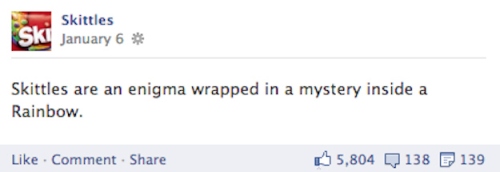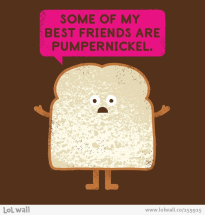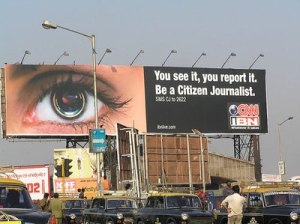After being published twice by wikinews, I gained much more confidence, and decided to follow David’s advice and see if I could publish an original article. I had written an article for uni about ‘dumpster diving’ the year before and I found it very interesting and was keen to revisit it. I had really liked this article and felt that having written about the topic before, I had an advantage in terms of interview sources and my understanding of the issues surrounding dumpster diving. I also wanted the chance to explore some aspects of the topic that I hadn’t had space for in my original article. I knew that if I were to write on this topic again I should avoid the personal opinion style, as although this is suited for blogs, it was probably a little too casual and I would really limit my options for getting it published. The following is the article I wrote last year- my launching pad for my original story.
Would you eat from a bin? A glimpse into the world of ‘dumpster diving’
Every day Australian supermarkets throw out tons of waste. During the night groups of people rummage through their skip bins for food. We take a look into the world of these ‘dumpster divers’ and find out why they eat food from bins.
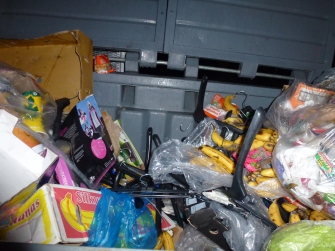
Looking for a unique, affordable dating option? Why not take a tour of the local supermarket skip bins and see what you can find? This may not be for everyone, but journalism student Claire Johnston seems quite proud of the fact that one of her first dates with her boyfriend of two years involved ‘dumpster diving’.
Claire is only one of a surprising number of people in the Wollongong area who regularly collect food from skip bins for personal consumption. Although supermarket bins tend to be their favourite and most lucrative hunting ground, ‘dumpster divers’ frequent many different kinds of locations and often scavenge non-food items. This could include bottle shops, electronics stores and bakeries.
Understandably, this is an activity that many people are repulsed and confused by. ‘I think it’s pretty disgusting,’ says Caitlyn Reynolds, who is a communications student. ‘I understand some people are desperate and that a lot of the foods that supermarkets chuck out are still well in date, but I’m sure there are alternatives.’ Third year science and history major, Keira Webb, agrees. ‘I wouldn’t root around in a dumpster because you never know what gross thing you might find in there!’
I was similarly perplexed by the practice when I first learned of it a little over a month ago, as it had never occurred to me that someone might eat food from a bin out of any motive other than desperation. It was curiosity about a conversation which seemed to characterise dumpster diving as a rational activity, which led me to a group of people who made me reconsider how I view waste.
The types of people I ended up talking to surprised me. Instead of desperate homeless people or extremist, unwashed hippies, the dumpster divers I met with were educated, well-dressed and thoroughly convicted in their ideals. From the editor of the student magazine ‘Tertangala’, to young environmental activists, to an academic; they all seemed to be rational and intelligent people. So why would they eat out of a bin?
Dr Andrew Whelan, a sociology lecturer at the University of Wollongong, and a former dumpster diver himself, agrees that it’s essential to consider why this happens at all. ‘I think it’s important to go- who are these people who do this thing, and why?’ he says. ‘Why would someone go and lean into a smelly bin to get something out and then take it home and eat it?’
This was the scenario Bess Murphy was confronted with one evening when she and her boyfriend went to dinner with some people they had just met. Their new friends announced they were going dumpster diving and invited the couple along. ‘I hadn’t even thought about it before.’ Despite initial hesitation, they agreed. ‘It was just so surprising what supermarkets throw out,’ she said. Bess was converted after seeing the sheer amount that supermarkets were throwing away. ’Too much to take. That’s how much food there can be,’ she said.
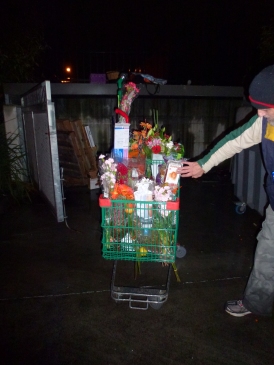
Michael shows us his trolley
Every dumpster diver had their own story of surprising finds, from hundreds of watermelons to 30 punnets of strawberries to a microwave. Most had collected day old bread and cartons of eggs that had to be thrown out because one was broken. ‘One time we opened up the dumpster and there was just all cordial. Just huge quantities of cordial,’ said Claire, ‘Choc a block.’ Large quantities of fruit and vegetables were common. Bess believed that this was due to shoppers’ unrealistic expectations. ‘You go into Woollies and you see all these apples and they’re all shiny and beautiful and there are no marks on them. That’s not what apples are like!’
These stories were so unbelievable that I realised I had to check it out for myself. So late one overcast evening, a friend and I took a trip to a local dumpster. There we met 56 year old Michael who had just finished filling up a trolley with an array of different items, many of which he said would be given away to the needy. He was pleased to talk to us and show off his finds which included various fruit, eggs, frozen vegetables, bread and even a mop and gardening decorations. He also offered us some flowers that he’d found in another bin. ‘There was about $2000 worth in it, I reckon’.
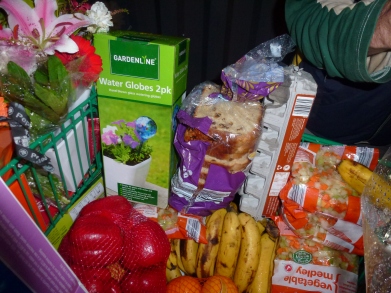
Michael’s full trolley was just the beginning. In the dumpster and surrounding it were healthy-looking bananas, melons, baskets, coat hangers and cereal. My friend and I were stunned at how much had been thrown away. I understood now why so many people felt compelled to ‘rescue’ food from dumpsters. I felt sickened, not by the fact that people took these items from the bins, but that someone put them there in the first place. I felt my sentiments on the subject echoing Bess’ ‘I cannot believe how much food we throw out. I think it’s utterly irresponsible of us to live the way that we do when the majority of people don’t even have adequate access to food. I just think that’s the most disgusting thing ever.’
Dr Whelan describes an experience in which he was confronted with this issue. ‘We got to the dumpster, and it was summer, and it was noxious’ he said, recoiling a little at the memory of the rotten smell of piles of decomposing food. He watched as a homeless man continued scavenging through the dumpster and found himself confronted by the man’s tolerance of the refuse. ‘I was like…this is actually waste. This is garbage.’ he said. Dr Whelan said he wasn’t concerned about the health and safety implications of this, but instead considered it a moment of confrontation with poverty.
‘For a lot of people it’s about money. It’s cheaper than buying things. It’s cheaper than buying food,’ admits Bess. ‘When I was 18 or 19, it was just kind of opportunistic,’ recalls Dr Whelan, who as a young college dropout in Oxford thought that it was pretty stupid to turn down free food. ‘But for other people, it’s a lot more systematic. It’s part of a whole mindset.’
This is certainly true of Claire, who describes herself as a leftist and environmentalist who finds market capitalism irrational. She clothes swaps, composts and grows her own vegetables. ‘While it’s not changing the bigger picture dramatically,’ says Claire, ‘you’re learning practices and learning how to live more sustainably.’ She considers her lifestyle as an investment into her children’s future. Bess, who is active on environmental and humanitarian issues, says she would consider herself a hypocrite if she hadn’t changed her habits and continued to contribute to food wastage.
Although these ideals may be convincing, there is no way of avoiding the issue of hygiene. Supermarkets that lock their bins often cite health concerns and duty of care as their motivation. Dumpsters are, after all, bins- which are made to contain waste products. Food poisoning is a very real concern for dumpster divers. Michael recalled one incident in which someone had become sick after eating meat from a dumpster and then sued the store. Many dumpsters were locked up as a result.
In fact, among the dumpster divers I talked to, there was a surprising lack of anxiety about the cleanliness of the food. ‘Food stays in people’s fruit bowls longer than it stays in the dumpster’ said Claire, who explained that most of the food they found was packaged. ‘You can be as picky or not picky as you want,’ said Bess. None of the people I talked to had ever become sick as a result of dumpster diving. They picked out their food carefully, often with gloves on and then took it home to wash. Meat, dairy products and other highly perishable items were generally avoided. Michael even came equipped with a cleaning product.
However, even with good intentions and safe practices, dumpster diving is an area that remains legally foggy. Although there are no laws specifically forbidding taking food from bins, dumpster divers can run into trouble for trespassing, breaking and entering and even ‘stealing by finding’ which is when someone finds something and doesn’t make a reasonable attempt to find its owner. Police and security guards tend to be fairly lenient, however, and usually just ask them to move on. Of the people I talked to, Michael was the only one who’d encountered security.
Dr Whelan admitted that although he considered dumpster diving to be a good thing, the shady legal nature of it and the way we think about waste meant that it would never become mainstream. However he was unconcerned about this and said that it remained politically important that some people dumpster dive.
All of the dumpster divers I talked to agreed on this point. Although they were keen to see more people join in, they saw it as only a temporary solution to a systemic problem. Bess and Dr Whelan wanted to see laws change to make it easier for supermarkets to give their out-of-date food to charities, and all of them wanted stores to act more responsibly when it came to waste. ‘Dumpster diving is a good way to start that conversation or to get people thinking about that,’ said Dr Whelan.
 The internet is a ridiculously powerful piece of read/write communication technology. We just have to look at how quickly memes spread and how
The internet is a ridiculously powerful piece of read/write communication technology. We just have to look at how quickly memes spread and how unpredictable they are- anything from the ‘overly attached girlfriend’ to ‘ridiculously photogenic guy’ to Rebecca Black’s song ‘Friday’ (warning: clicking on this link will result in bleeding ears) to see how difficult governing this sphere is. We will never go back to a one-way broadcast culture- if that was ever a real thing. The internet is a ginormous and incredibly diverse forum and as such, consumers and audiences already have power. The issue now is what the gatekeepers’ roles and methods should be. How can online dialogue be governed effectively?
unpredictable they are- anything from the ‘overly attached girlfriend’ to ‘ridiculously photogenic guy’ to Rebecca Black’s song ‘Friday’ (warning: clicking on this link will result in bleeding ears) to see how difficult governing this sphere is. We will never go back to a one-way broadcast culture- if that was ever a real thing. The internet is a ginormous and incredibly diverse forum and as such, consumers and audiences already have power. The issue now is what the gatekeepers’ roles and methods should be. How can online dialogue be governed effectively? suited to their brand and to Facebook. Their strange little one-liners may just seem like silly non sequitors, but with over 25 million fans and their consistently positive dialogue on the page, it’s clear that Skittles have discovered how to effectively engage with their audience by paying attention to what they want from them. Unlike Tahoe, Skittles understood who they wanted to reach and how to do it without making them feel used and as a result they were able to shape online dialogue surrounding their brand.
suited to their brand and to Facebook. Their strange little one-liners may just seem like silly non sequitors, but with over 25 million fans and their consistently positive dialogue on the page, it’s clear that Skittles have discovered how to effectively engage with their audience by paying attention to what they want from them. Unlike Tahoe, Skittles understood who they wanted to reach and how to do it without making them feel used and as a result they were able to shape online dialogue surrounding their brand.
